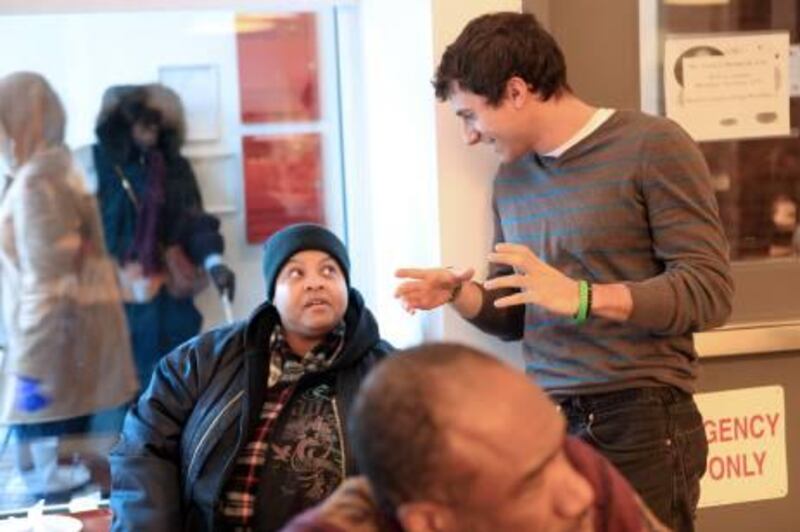NEW YORK // At a Brooklyn soup kitchen, the poor and homeless are getting a chance not only to fill their bellies but also learn about community organising and the politics of food.
Last Friday at lunchtime, Michael Paone, an organiser for the not-for-profit New York City Coalition Against Hunger (NYCCAH), stood up to address people eating at a busy soup kitchen run by the St John's Bread and Life Catholic church. He urged the diners to join a meeting of the group's food action board meeting that was about to start.
"We talk about issues in politics and economics that affect you. You can learn to take action," he said before referring to last month's deal that the president, Barack Obama, struck with the Republicans to extend Bush-era tax cuts. "For example, Congress just gave $600 billion (Dh2,200bn) to the rich in tax cuts. What's that about?"
"The rich are getting richer," said a member of his impromptu audience.
Similar food action boards operate at five soup kitchens across the city. Among other things, they run workshops on the basics of community organising - from teaching how legislation is made to drafting letters to city, state and federal representatives.
The NYCCAH says it is the voice of more than 1,200 nonprofit soup kitchens and food pantries in New York City and more than 1.4 million low-income New Yorkers who live in homes that cannot afford enough food.
Philip Malebranche, 52, is a regular at the St John's soup kitchen as well as the advocacy workshops. The professional tutor has a degree in sociology but has had a tough time finding steady work. He is one of millions of Americans whose incomes were hit by the recession compelling them to turn to charitable donations and government assistance.
Thanks to some support from his family, he is no longer drawing upon food stamps, a federal assistance programme that has undergone rapid growth in recent years.
However, more than one in eight Americans, about 41.8 million people, use food stamps each month, according to the department of agriculture. An individual earning no more than 30 per cent above the federal poverty level - about $14,000 a year - can receive up to $200 per month for groceries.
Mr Malebranche, who now spends much of his time alone researching and writing about interests that include Islam and the role of women, said the action board gives him a chance to socialise and learn new skills.
"I've never been involved in community organising before and I appreciate interacting with people, the training in skills like public speaking and getting to know about the issues," he said.
Rollie Hernandez, 62, another St John's regular, says that while the soup kitchen nourishes him literally, the board feeds his mind. "They give us bread but we need life too," he said. "People are hungry but crushed by society, by the big guys with all the money, by corruption and big business that take all the money leaving us with no jobs and we have to suffer."
Despite the thumping Republicans delivered to Democratic candidates across the country in last November's congressional elections, Mr Malebranche remains hopeful that Mr Obama, who worked as a community organiser on the South Side of Chicago in the 1980s, will be "sensitive to social issues that other heads of state would not".
Many people on the left of the political spectrum in the United States are nevertheless disappointed in Mr Obama's presidency, saying he has been too accommodating to Republicans and Wall Street. The conservative Tea Party movement meanwhile continues to attack government programmes, which they claim are dragging down the faltering economy.
But the NYCCAH's activists are undaunted and speak of the challenge of shifting US priorities to include the welfare of the poor.
"In a democracy, there are no permanent victories or defeats," said Joel Berg, the executive director, who also worked as a policy analyst for the administration of the former president Bill Clinton.
"This recession ended a second gilded age and now we need a second progressive era," he said, referring to the first gilded age of the late 19th century, when the US economy grew at record rates and was followed by the progressive era of reform and social activism to try to correct massive income inequalities.
"I was in government for eight years and I know how tough it's going to be. It's a question of values and priorities."






